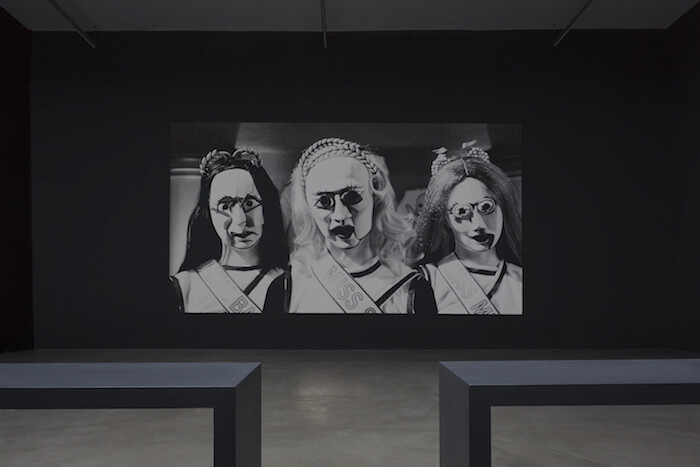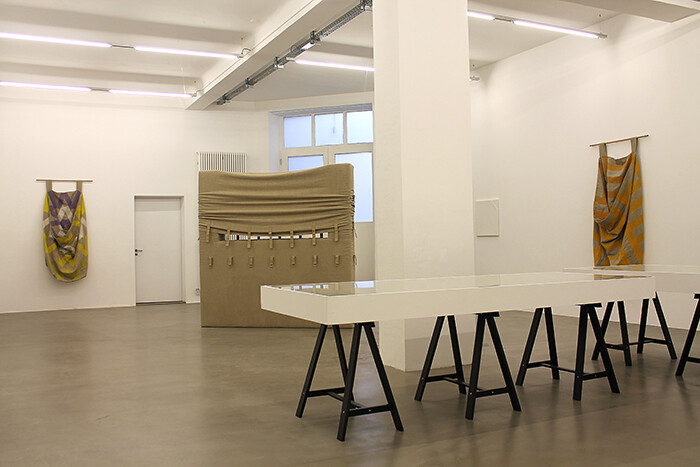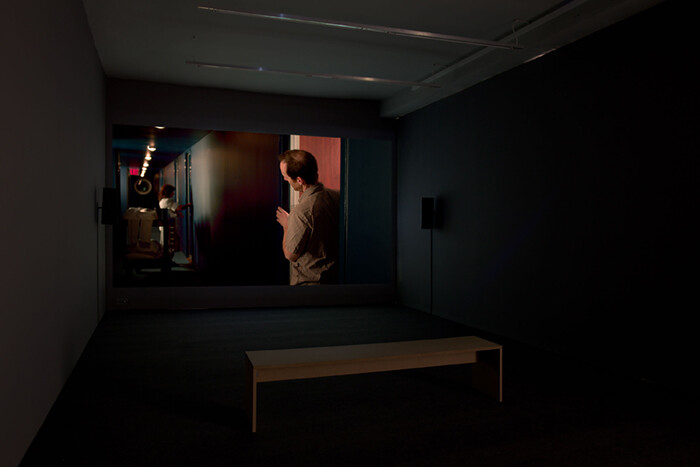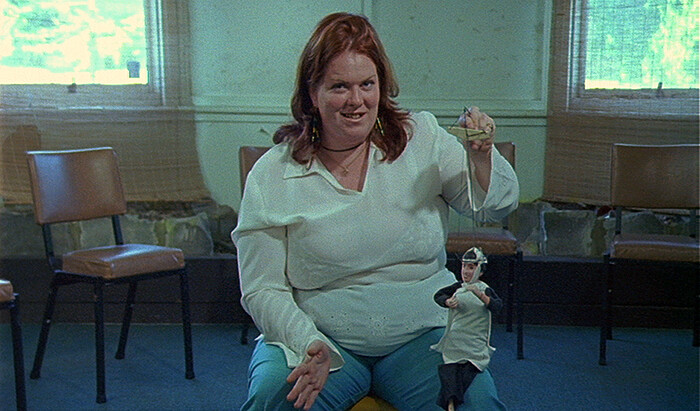Categories
Subjects
Authors
Artists
Venues
Locations
Calendar
Filter
Done
April 11, 2016 – Review
Mary Reid Kelley’s “The Minotaur Trilogy”
Ana Teixeira Pinto

Pasiphae, the protagonist of Mary Reid Kelley and Patrick Kelley’s film series “The Minotaur Trilogy” (2013–15), was the queen of Crete, married to king Minos, the son of Zeus and Europa. Her story is a tale of offence and punishment, but not a straightforward one. Minos, who had just ascended to the throne, asked the god Poseidon for support. Poseidon sent him a white bull, which in Minoan mythology was no bull but the god himself in his pre-Olympian form. The bull was supposed to be sacrificed to Poseidon but Minos deviated from due observance and kept it instead. As a punishment, the god cursed the queen with the most unnatural lust: a sexual urge to mate with the nonhuman other, which was god and animal at once. In order to copulate with the bull, Pasiphae made Daedalus build her a casket in the form of a cow, with which she could arouse the bull’s libido. Mistaking it for a mate, the bull coupled with the man/machine contraption, impregnating the queen inside. Unfortunately for all involved, the materialization of Pasiphae’s monstrous desire was bound to be a monster: the Minotaur.
Mary Reid Kelley’s queen was inspired by, and partially adapted from …
May 19, 2014 – Review
Friedrich Teepe
Judith Vrancken

Entering ARRATIA BEER from the back doorway, one encounters a sculptural object, covered in raw canvas and impressive in size. Padded and rectangular, it obstructs the view of the entire gallery. Through its center, which is weighed down by an extra layer of fabric, there is a row of buckles, unfastened. 1980/10 (1980) is raw, uninviting, yet captivating at the same time.
For Berlin’s 2014 Gallery Weekend, ARRATIA BEER invited guest curator Eva Wilson to organize a show of work by fairly unknown, and now late, German artist Friedrich Teepe (1929–2012). The show marks Teepe’s first exhibition in 25 years and his first-ever solo show in Berlin. Though shying away from working exclusively as a professional artist, Teepe never stopped producing art alongside his career as a secondary school teacher in Osnabrück. So what could a young curator’s motivation be for interacting and promoting an artist who voluntarily stayed off the art world radar? Might it be an interest in his successful attempt to maintain a sense of autonomy by steering clear of the competitive art market? Or does this curatorial effort count as an exploration of art on the periphery in hopes of canonizing it?
Working with an artist’s oeuvre automatically …
January 18, 2013 – Review
Omer Fast
Maia Gianakos

In a world mediated by images, where the brutality of remote events is diluted by means of oversaturation and repetition, how does the real endure? And in the space of the cinema, where narratives are taken as spellbinding truths, what constitutes the real? When entering into the cinematic contract, we often abandon ourselves to fiction, falling into a suspension of disbelief that prioritizes one reality over another. This tacit agreement is the very substance of 5,000 Feet Is the Best (2011) and Continuity (2012), two films by Omer Fast on view at Arratia Beer that focus on the topic of war—a reality that transcends cultural divisions and dominates the collective global conscience—to expose structures of representation and the dissemination of information.
Installed in opposite corners of the gallery’s exhibition space, the two films are separated by walls whose bare supports remain visible, a practical decision that conveniently echoes the pivotal structural reveal taking place within each filmic narrative. First shown at the 2011 Venice Biennale, 5,000 Feet Is the Best stems from a series of conversations Fast conducted with a US Air Force Predator drone operator, who reflects on his daily duties and the psychological effects of live-fire missions in Pakistan …
February 7, 2011 – Review
Javier Téllez’s "O Rinoceronte de Dürer" at Arratia, Beer, Berlin
Ana Teixeira Pinto

With both parents working as practicing psychiatrists, Javier Téllez tells us that early in life he found it difficult to distinguish the boundaries between normalcy and pathology. Having experienced the plight of mental patients from an all-too-personal perspective, he soon began to embrace collaborations with the mentally afflicted as his preferred working method. Though formally diverse, his films La Passion de Jeanne d’Arc - Rozelle Hospital, (2004), Caligari und der Schlafwandler, (2008) or Oedipus MarshallI, (2006) all share a common thread: Téllez actively engages patients of local clinical facilities in the structuring of each project. The acting thus becomes a poignant testimony to the dialectics of authoritarianism and disenfranchisement, making manifest how exclusion, abandonment, and poverty are determining features of the patients’ illnesses, from whose perspective society is a symptom and culture a communication code defined as much by what it excludes as by what it embraces.
His most recent show, “O Rinoceronte de Dürer” (Dürer’s Rhinoceros), at Arratia, Beer in Berlin, clearly elects the eponymous film Téllez shot in Lisbon in 2010 as its core piece. Originally commissioned by Isabel Carlos for CAM-Gulbenkian, the project was filmed at the panopticon of the Hospital Miguel Bombarda, built in 1896 and kept …